Follow the Leaders
Guided by the Gestalt Protocol, Peer Groups Offer VACEOs Members a Safe Haven
Imagine seated to your right is someone who has made the Inc. 5000 list not once, but EIGHT times. Seated around the table to your left are several RVA 25 CEOs representing the technology, consumer products and staffing industries. Each is focused on your question, issue or opportunity. You finally realize: you are not alone. This is the feeling each VACEOs member has experienced during a Roundtable or Forum session.
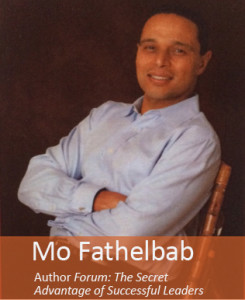 All new VACEOs members are assigned to a peer roundtable. It quickly becomes a safe haven – a place to vent, ask questions, release fears and build life-long friendships.
All new VACEOs members are assigned to a peer roundtable. It quickly becomes a safe haven – a place to vent, ask questions, release fears and build life-long friendships.
“Peer roundtables are important because they provide a unique opportunity to share and learn with a group of peers in a completely safe environment,” says Mo Fathelbab, Forum Resources Network president and author of Forum: The Secret Advantage of Successful Leaders.
“As a CEO, it’s often lonely at the top. You can’t share everything with your employees, partners, board members or investors. Members of a Roundtable have no personal interest in your decisions,” he adds.
Forum: The Secret Advantage of Successful Leaders explains Roundtable methodology and is required reading for all new VACEOs members.
“The Council’s Roundtables have been designed intentionally around the principles found in Fathelbab’s book,” says Scot McRoberts, executive director, VACEOs. “Each member is trained about our disciplined meeting process, which follows very specific language and meeting protocols. This is to ensure that every member gets the most out of the Roundtable or Forum meetings.”
“NO ADVICE” POLICY (GESTALT LANGUAGE PROTOCOL) IS KEY
All VACEOs Roundtables adhere to a set of ground rules by which the group must abide. Chief among them is strict adherence to a code of confidentiality and Gestalt Language Protocol.
“The Gestalt Protocol is based on the theory that as children we were always told what to do by our parents,” explains Fathelbab. “As a result, adults – especially entrepreneurs – resent being told what to do by anyone.”
The guiding principle of the protocol is to never give advice, but to share related experiences instead. Participants are careful to avoid phrases such as “If I were you…” when another group member presents his or her challenge. Learning to participate in a group this way takes effort and practice, but it’s essential for creating a safe, rewarding experience.
“Advice can be flat-out wrong,” says Fathelbab. “It can be judgmental. Advice creates an unsafe environment in a Roundtable, Peer Exchange Group or Forum. Each of us is best equipped to solve our own problem. The best anyone can do is to share their experience, allowing the person with the problem to glean from that experience what is best for him or her.”
“Sharing experiences allows members of a group to get closer by learning more about one another,” he continues. “By contrast, giving advice to a single member robs the group of all of the stories that can be so educational and socially bonding.”
ARE YOU IN NEED OF A SAFE HAVEN?
The Council is one of a handful of independent regional organizations of its kind in existence. Members enjoy the benefits of networking, camaraderie and the “safe haven” found in their roundtables and in their interactions with 180 other CEOs. Ready to learn more? View VACEOs membership info today.
How to Build a Winning Company Culture
Do a little background research on Rich Reinecke and you quickly turn up words and phrases like “entrepreneur,” “executive search industry professional” and “largest firms in the country.” But that’s old news. Today he’s a business builder and connector, a hirer of phenomenally talented people, and a nurturer of one officially great place to work.
His company, The Fahrenheit Group, which he co-founded with Keith Middleton in 2010, has evolved organically into a successful multi-dimensional, fractional hiring, and business consulting firm — complete with accounting, finance, business advisory HR and talent acquisition divisions. The company’s client roster reads like a Who’s Who of some of the most recognized large companies in the country. The staff are seriously smart C-suite executives and professionals who have been there, done that.
His staff demands a unique business environment and opportunities. They know what a great place to work for looks and feels like, and they’re the reason why The Fahrenheit Group has twice been named one of the Best Places to Work in Virginia.
Reinecke says his company’s growth has been fueled by its work culture. Here are a few tips from him that could get your business on the right track toward success.
FIVE WAYS TO CREATE A GREAT COMPANY CULTURE
1) Be bold. Ask. It’s a simple first step that many companies ignore. Ask your employees what they think about their workplace environment. Ask for their feedback and listen. Make adjustments. Ask again. Then watch employee morale and camaraderie begin to grow.
2) Think “team,” not “us vs. them.” Reinecke says this is more than a shift in nomenclature – it means allowing your staff to give input freely without concern over reprisal. It means polling or asking team members things like, “What could we be doing about…” or “What do you think about this?”
3) Create an attractive environment. Is your physical space comfortable? Welcoming? Friendly? Does it complement or detract from your brand’s image? Reinecke describes Fahrenheit’s space as edgy and innovative – which pairs perfectly with the out-of-the-box thinking the company’s co-founders encourage. Says Reinecke, “Do the little things right to encourage your employees to want to be at work, even if that’s simply having Diet Coke in the refrigerator.”
4) Keep everyone engaged. Regular information-sharing sessions are one important way Fahrenheit’s staff stays involved in the business. “We try to mix some social aspect into our team meetings that allows employees to really interact and get to know each other at a meaningful level. Relationships create accountability to each other and a desire to help everyone win.” Reinecke also encourages and empowers his team to create new business opportunities.
5) Give regular feedback. “Everyone wants to know if they’re making a positive impact. Share what information you can on that front. Regularly report to the team as a whole and individually in private,” says Reinecke.
ABOUT THE FAHRENHEIT GROUP
“The Fahrenheit Group is a team of experienced C-suite executives and consultants who collaborate with management and define strategy and build roadmaps to execute and deliver measurable results. We serve clients across all industries, ranging in size from emerging growth companies to Fortune 500 firms, including VCs and private equity-backed portfolio companies. From accounting, finance and HR projects to M&A and advisory engagements, we have talent that transforms the world of business.” – Rich Reinecke, co-founder, The Fahrenheit Group.
What’s On Our Minds…
THINK ABOUT IT.
It’s very likely your customers could be judging your entire brand on one simple interaction.
Said another way…
- – Your best prospect was treated rudely by your new receptionist.
- – Your delivery truck was last seen at 2:00 pm outside a seedy bar.
- – The bathroom in your five-star restaurant doesn’t have toilet paper or towels.
There are hundreds of ways your brand is rightly or wrongly “judged” — either by direct interactions with your employees, or by other random, indirect encounters. How aware are you of those moments?
Do you know how to engage your employees and teach them how to be sincere advocates of your business? The VACEOs members who attended the recent Knowledge Network Luncheon do.
Come join us! ‘Cause if you didn’t get a least ONE solid business nugget at your last meal, you’re dining with the wrong group.
This “What’s On Our Minds” moment from VACEOs Knowledge Network Luncheon, “Understanding and Controlling Your Hidden Brand: The Tug-of-War of the Brand Experience” presented by Glenn Lock, tacklocktraining.com.
UR MBA Capstone Project Gives VACEOs Members Fresh Perspective
Ever feel like you can’t see the forest for the trees? As CEOs, we’re often so busy with the day-to-day details of running our business that we don’t see the big picture. To make matters worse, our view of our business is often clouded by our own judgments and biases. So it can be a real challenge to get an accurate snapshot of what’s happening around us and what’s going on in our industries. Sometimes it helps to get a fresh perspective – and that’s exactly what two VACEOs members recently did.
Henry Clifford, owner of Livewire, and Maria Candler, president and CEO of James River Grounds Management, found clarity through a VACEOs partner connection: the University of Richmond (UR)’s Robins School of Business. More specifically, the members participated in a Richmond MBA Capstone Project.
“The Capstone is a faculty supervised, graded, pro-bono, confidential high-level consulting project that our MBA students, on an individual basis, conduct for organizations and companies in and outside of Richmond,“ says Debbie Fisher, Associate Director, MBA Program, Robins School of Business.
As manager of the Capstone Program, Fisher’s role is to connect Capstone students with local, U.S, and international businesses. As a VACEOs partner, she has unique access to a diverse and broad-minded pool of CEOs. Says Fisher, “I felt very welcomed by the Council from my first encounter with the group. I value the diversity and openness of the membership. The members are very receptive to exploring new ideas and giving our students an opportunity to share their expertise.”
WHAT CAPSTONE DELIVERS
The objective of the Capstone Project is for students to use concepts they’ve learned in The Richmond MBA to address a strategic challenge facing a host organization.
“The University encourages our students to be involved in the community,” explains Fisher. “One way our MBA students connect with and help the community is through the Capstone Program. They take the skills they’ve honed in their careers, combine that with the newfound expertise they’ve gained through their studies at the Robins School, and apply that knowledge to the organization’s business. It’s an incredible opportunity for everyone involved.”
A typical Capstone deliverable includes a thorough examination of the organization’s strengths, weaknesses, opportunities and threats. It also includes a competitive analysis and anticipation of industry trends. The student’s final report focuses on specific recommendations for addressing the core strategic issue. These recommendations are based on solid justifications grounded in relevant research and the knowledge students gain in the MBA program.
At the conclusion of the project, students deliver their recommendations to the host organizations’ leaders in a formal presentation. Fisher attends all of the final presentations herself, and she says many of the host organizations are amazed by the thoroughness and professionalism of the final product. Afterwards, she often hears comments like, “The value of these recommendations far exceeded my expectations, and we will definitely incorporate your suggestions in our work going forward!”
The most exciting results come when a business issue is aligned with a student’s passion.
LIVEWIRE AND JAMES RIVER GROUND MANAGEMENT DISCOVER A NEW PERSPECTIVE
Fisher’s relationships with organizations like VACEOs help her build a strong pool of business candidates for Capstone students to partner. She also develops contacts through her involvement with groups like the Association for Corporate Growth and Venture Forum RVA. She connects with companies through faculty members introducing her to their class guest speakers and through meetings and events organized by the University. When an organization is interested in the program, they apply for a Capstone through the Capstone online application process. Connecting students to companies happens after Fisher speaks candidly with students about their passions and desired experiences.
“Some students want to do a ‘give back’ type of project,” says Fisher. “Some students want to learn something completely different from what they do in their day-to-day work. Others might want the chance to work with an entrepreneurial firm or a medium-sized business, or they may want to do a project focused on healthcare or manufacturing. I try to find out what they’re passionate about because I want to feed or further that passion. Those make the best Capstone matches.”
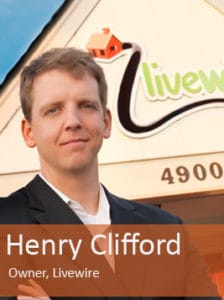 The student who worked with Livewire’s Henry Clifford had a passion for technology. Says Clifford, “We were honored and excited to be chosen to work with a Capstone graduate student. Tom Quigley wanted a big challenge, so we asked him to find expansion opportunities for us. We wanted to know what other products or services or trends are out there that we’re not aware of and, of those, what could prove advantageous or threatening to the business.”
The student who worked with Livewire’s Henry Clifford had a passion for technology. Says Clifford, “We were honored and excited to be chosen to work with a Capstone graduate student. Tom Quigley wanted a big challenge, so we asked him to find expansion opportunities for us. We wanted to know what other products or services or trends are out there that we’re not aware of and, of those, what could prove advantageous or threatening to the business.”
“I was blown away by his presentation,” Clifford continues. “He gave us trends and analysis and backed up his recommendations with sound data. I grilled him, and he had answers for every question I asked. It was a great experience. It was really nice to have someone look at my business with fresh eyes – to cut through the fog that I have because I’m too close to the industry.”
“… TAKE THIS BUSINESS ISSUE AND DELIVER SPECIFIC STRATEGIES TO IMPROVE OUR FINANCIAL RESULTS … “
Maria Candler of James River Ground Management gave her Capstone student a particularly challenging issue to tackle. “When asked about our biggest business challenge, the answer has been consistent for years: growing a business and keeping your product standards high while dealing with a constant and severe labor shortage.”
Candler explains, “To set the stage, we have approximately 225 seasonal positions annually in our firm. To fill those positions, we generally process about 2,000 applications and lose roughly 60 percent of our prospects through the pre-employment background and drug screenings. The lack of quality employees at that level creates extraordinary pressure points throughout the organization. It could also be argued that there are shortages of qualified management candidates, as well. Haynes’ project was to take this business issue and deliver specific strategies to improve our financial results while operating in this difficult climate.”
“Haynes King’s presentation really blew me away with the depth of his research to build data around this issue,” Candler continues. “He interviewed nearly 50 employees at all levels within the company and at every location. His project was thorough, supported by good research both internally and externally gathered. I would have paid a consultant good money for what he delivered.”
“My only concern when initially approached by Debbie Fisher at UR was the availability of time to work with a student on such a large project,” adds Candler. “Haynes was so respectful of our time and not intrusive at all. In fact, I feel like our team really benefited from his interviews. He was such a professional. I would recommend this program to any of my CEO counterparts. In fact, I hope to do another in the next couple of years.”
VACEOs members are innovators and free thinkers. They’re open to new ideas, and they THRIVE because of the connections they make. Does your business need a lifeline? Learn more about VACEOs membership today.
In Focus: Taradel, Seven Time (and counting) Inc 5000 Company
Gone are the days of selling print to a narrow audience from your bedroom office. Your value proposition and market are cast over a much wider space now. Your new digs, nearly 5,000 square feet.
Your current endeavor has taken you from zero employees to 22 in a quick 10 years. Many measure your success by how many times your business has made the Inc. 5000 Fastest-Growing Companies list (seven and counting).
When asked what one piece of advice you’d give a budding entrepreneur, you say, “Be decisive. You can’t move forward without data points. That was a valuable lesson I learned from a CEO a long time ago. A lot of folks hesitate over whether to make an investment or whether they should make a move. Wrong or right, you’ve got to start somewhere so you have a starting data point. You can’t manage indecisiveness.”
Behold! You’ve have entered the world of Jim Fitzgerald, CEO of Taradel. Three-time successful entrepreneur. Print-and-deliver mega-star. VACEOs member.
TARADEL: ON THE WINGS OF SMALL BUSINESS
Jim Fitzgerald started what would later become Taradel in 2003. From a small desk in a spare bedroom, he crafted a simple plan to make full use of his extensive print and design knowledge. His goal was to offer an inexpensive, high-quality, fast-print advertising insert solution for the newspaper industry. When his idea came to fruition, his newspaper clients were wild about the ROI, and small business advertisers were wild about the newspapers’ reach and the customized direct mail piece that was produced. It was a win-win for all.
It didn’t take long before Fitzgerald’s business model evolved. He explains, “I got to the point where I couldn’t scale the business, so I found a web developer and built a website where the customers could place their orders themselves. It wasn’t long after that I realized we had two really good assets: great pricing on a product with wide demand and a great online web-to-print engine. We dressed it up and started offering those print products to everyone. That was in 2004.”
Today, Fitzgerald describes Taradel as a place where small business owners can create a targeted direct mail campaign in under 10 minutes. Dig deeper and we quickly learn his value proposition is much more extensive. Turns out Taradel has an eye for data and digital, too. The company is heavy into things like data mining and heat mapping databases, building custom integrated websites and campaigns that span marketing disciplines.
Fitzgerald’s target market is still small businesses owners, but Taradel now works with national franchisors, as well. The company has also recently expanded into Canada.
SEVEN-TIME REPEATER. WHAT’S THE SECRET?
To date, Taradel has made the Inc. 5000 Fasting-Growing Companies list seven times, coming in at #2480 for 2014. Fitzgerald absolutely expects to hear from the Inc. team again this August. Very few businesses can claim this remarkable status. What’s his secret?
“Hire great people,” says Fitzgerald. “It sounds silly, but I talk to a lot of colleagues who have problems with their staff. By ‘great,’ I mean – and I’m stealing from Cameron Herold, who I heard speak at the last VACEOs Retreat – I don’t ever motivate people. I hire motivated people. When we bring someone in, they will meet at least six or seven team members. When the team gets together to talk about that candidate, if it’s not a collective ‘hell, yeah,’ then it’s a no. It’s that simple. Whenever we violate that rule, we regret it.”
Another key? “Build a world-class inbound marketing platform,” he says. “We get a hundred leads a day. We never make a cold call. We use a variety of methods for inbound, including SEO, search engine marketing, display advertising, content generation and automated marketing campaigns. Once people look for the products we sell, there’s a very good chance they will land on our website.”
A sense of urgency also fuels Taradel’s success. Sure, the company is pretty much guaranteed to make the next Inc. 5000 list, but there isn’t an unlimited amount a capital available, says Fitzgerald. He says, jokingly, “We eat what we kill. Every week, we have to hit a number, and that creates a sense of urgency in the environment. I also think that’s an important reason for our growth.”
ONWARD AND UPWARD
Taradel recently secured a large Canadian account, and Fitzgerald reports that he’s hopeful new opportunities in Australia and England will be finalized soon. In the meantime, he’s firmly focused on his current customer base.
“We’ve recently customized a website for a client that integrates our email and direct mail databases and marketing initiatives for them,” says Fitzgerald. “That’s really exciting! Our website will soon have an integrated marketing road map for business owners. From our site, you’ll be able to generate integrated direct mail, email, Facebook and display advertising campaigns to a specific target audience in about 10 minutes.”
Is Fitzgerald worried that direct mail and print – his original bread and butter – might be going away? It doesn’t appear so.
“Here’s why I love print. If I go to a meeting with CEOs and ask for those who understand how direct mail works, most will raise their hands. If I ask how re-marketing or pay-per-click advertising works, much fewer hands go up. My point is everyone understands direct mail. The reality from our perspective is that print is out-producing digital media in measurable terms. We see direct mail as an important part of an integrated marketing campaign and an important bridge to the digital side of marketing, which we understand very well. At the end of the day, we want to make it easy for any small business to create integrated campaigns.”
Imagine you had a network of resources to help you navigate through the complex challenges you face each day as a leader. A group of like-minded people to help guide you through your questions about finances, employee concerns or marketing issues. You do in the Virginia Council of CEOs.

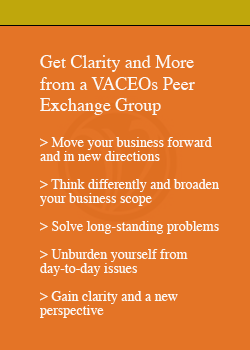
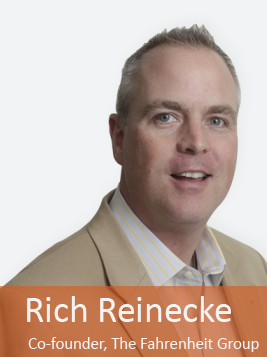
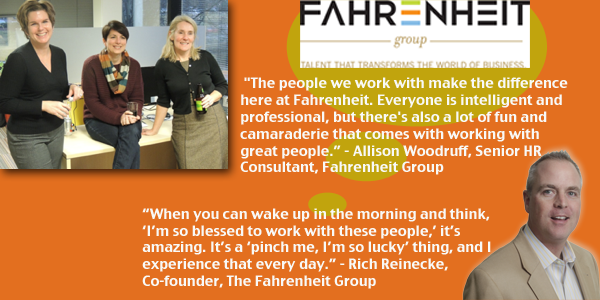
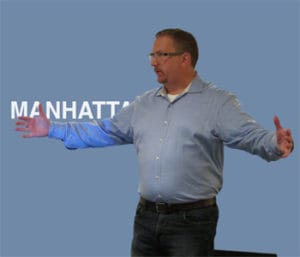
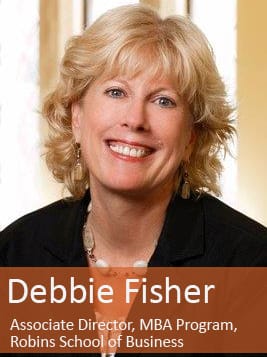
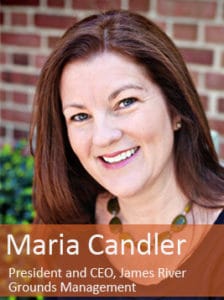
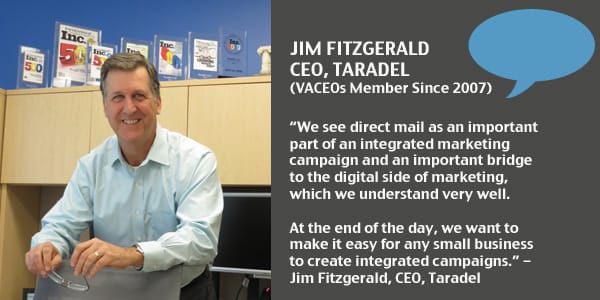
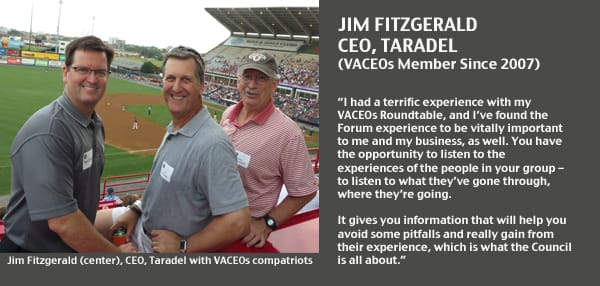
Recent Comments